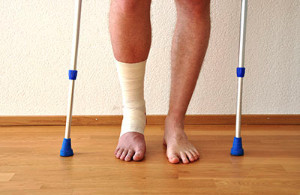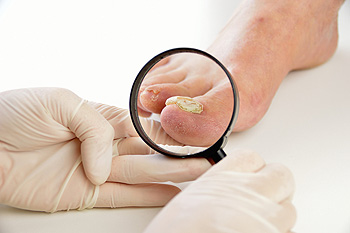May 2019
Healing Time Frame for Stress Fractures
 Stress fractures are tiny cracks in the bones of the feet. They occur as a result of participating in activities that cause the bones in the foot to weaken and crack faster than the healing process can begin. This can occur due to several reasons, including training in your chosen sport before adequate healing has been completed, increasing the amount of time training in a short period of time, or running on different surfaces. The symptoms that are associated with stress fractures often include swelling, burning pain, and difficulty walking on the affected foot. Effective treatment begins with staying off the foot for several weeks, depending on the severity of the injury. This can be accomplished by wearing a cast. If you have sustained a stress fracture, speak to a podiatrist who can guide you toward proper treatment options.
Stress fractures are tiny cracks in the bones of the feet. They occur as a result of participating in activities that cause the bones in the foot to weaken and crack faster than the healing process can begin. This can occur due to several reasons, including training in your chosen sport before adequate healing has been completed, increasing the amount of time training in a short period of time, or running on different surfaces. The symptoms that are associated with stress fractures often include swelling, burning pain, and difficulty walking on the affected foot. Effective treatment begins with staying off the foot for several weeks, depending on the severity of the injury. This can be accomplished by wearing a cast. If you have sustained a stress fracture, speak to a podiatrist who can guide you toward proper treatment options.
Activities where too much pressure is put on the feet can cause stress fractures. To learn more, contact Dr. Steven Schwartz from Pennsylvania. Our doctor can provide the care you need to keep your pain free and on your feet.
Dealing with Stress Fractures of the Foot and Ankle
Stress fractures occur in the foot and ankle when muscles in these areas weaken from too much or too little use. The feet and ankles then lose support when walking or running from the impact of the ground. Since there is no protection, the bones receive the full impact of each step. Stress on the feet can cause cracks to form in the bones, thus creating stress fractures.
What Are Stress Fractures?
Stress fractures occur frequently in individuals whose daily activities cause great impact on the feet and ankles. Stress factors are most common among:
- Runners
- People affected with Osteoporosis
- Tennis or basketball players
- Gymnasts
- High impact workouts
Symptoms
Pain from the fractures occur in the area of the fractures and can be constant or intermittent. It will often cause sharp or dull pain with swelling and tenderness. Engaging in any kind of activity which involves high impact will aggravate pain.
If you have any questions please feel free to contact our offices located in Chambersburg, and Mcconnellsburg, PA . We offer the newest diagnostic and treatment technologies for all your foot and ankle needs.
Facts About Toenail Fungus
 The purpose of the toenail is to protect the toes against injury. Many patients experience toenail fungus at some point in their lives. They often notice the nail will change consistency and has a yellow or white tinge to it. Additionally, the nail will become darker and thicker as the fungus grows deeper into the nail bed. This condition is considered to be contagious, and the fungus that causes this thrives in warm and moist areas. These include public pools and surrounding areas, shower room floors, and locker rooms. As the fungus progresses, the nail may become brittle, and may have a foul odor to it. It may be possible to prevent this type of fungus from entering the body. This can be accomplished by wearing appropriate shoes while in public areas, and changing your socks often if they are wet for the majority of the day. Please consult with a podiatrist for additional information about toenail fungus.
The purpose of the toenail is to protect the toes against injury. Many patients experience toenail fungus at some point in their lives. They often notice the nail will change consistency and has a yellow or white tinge to it. Additionally, the nail will become darker and thicker as the fungus grows deeper into the nail bed. This condition is considered to be contagious, and the fungus that causes this thrives in warm and moist areas. These include public pools and surrounding areas, shower room floors, and locker rooms. As the fungus progresses, the nail may become brittle, and may have a foul odor to it. It may be possible to prevent this type of fungus from entering the body. This can be accomplished by wearing appropriate shoes while in public areas, and changing your socks often if they are wet for the majority of the day. Please consult with a podiatrist for additional information about toenail fungus.
For more information about treatment, contact Dr. Steven Schwartz of Pennsylvania. Our doctor can provide the care you need to keep you pain-free and on your feet.
Toenail Fungus Treatment
Toenail fungus is a condition that affects many people and can be especially hard to get rid of. Fortunately, there are several methods to go about treating and avoiding it.
Antifungals & Deterrence
Oral antifungal medicine has been shown to be effective in many cases. It is important to consult with a podiatrist to determine the proper regiment for you, or potentially explore other options.
Applying foot powder on the feet and shoes helps keep the feet free of moisture and sweat.
Sandals or open toed shoes – Wearing these will allow air movement and help keep feet dry. They also expose your feet to light, which fungus cannot tolerate. Socks with moisture wicking material also help as well.
If you have any questions please feel free to contact our offices located in Chambersburg, and Mcconnellsburg, PA . We offer the newest diagnostic tools and technology to treat your foot and ankle needs.
Children and Ingrown Toenails
 If your child complains of pain on the side of the big toe, it may be indicative of an ingrown toenail. Additional symptoms include swelling and redness in the corner of the affected toe, difficulty in walking, and possible drainage. This condition typically develops as a result of toenails that are trimmed incorrectly, or from wearing shoes that do not fit properly. Mild relief can be obtained from soaking the affected nail in warm water, which may help to soften the nail. If the symptoms become severe, it is advised to speak to a podiatrist as quickly as possible, so proper treatment can begin.
If your child complains of pain on the side of the big toe, it may be indicative of an ingrown toenail. Additional symptoms include swelling and redness in the corner of the affected toe, difficulty in walking, and possible drainage. This condition typically develops as a result of toenails that are trimmed incorrectly, or from wearing shoes that do not fit properly. Mild relief can be obtained from soaking the affected nail in warm water, which may help to soften the nail. If the symptoms become severe, it is advised to speak to a podiatrist as quickly as possible, so proper treatment can begin.
Ingrown toenails may initially present themselves as a minor discomfort, but they may progress into an infection in the skin without proper treatment. For more information about ingrown toenails, contact Dr. Steven Schwartz of Pennsylvania. Our doctor can provide the care you need to keep you pain-free and on your feet.
Ingrown Toenails
Ingrown toenails are caused when the corner or side of a toenail grows into the soft flesh surrounding it. They often result in redness, swelling, pain, and in some cases, infection. This condition typically affects the big toe and may recur if it is not treated properly.
Causes
- Improper toenail trimming
- Genetics
- Improper shoe fitting
- Injury from pedicures or nail picking
- Abnormal gait
- Poor hygiene
You are more likely to develop an ingrown toenail if you are obese, have diabetes, arthritis, or have any fungal infection in your nails. Additionally, people who have foot or toe deformities are at a higher risk of developing an ingrown toenail.
Symptoms
Some symptoms of ingrown toenails are redness, swelling, and pain. In rare cases, there may be a yellowish drainage coming from the nail.
Treatment
Ignoring an ingrown toenail can have serious complications. Infections of the nail border can progress to a deeper soft-tissue infection, which can then turn into a bone infection. You should always speak with your podiatrist if you suspect you have an ingrown toenail, especially if you have diabetes or poor circulation.
If you have any questions, please feel free to contact our offices located in Chambersburg, and Mcconnellsburg, PA . We offer the newest diagnostic and treatment technologies for all your foot care needs.
Children’s First Shoes
When walking first begins, many children walk with their feet apart, and this is beneficial in maintaining balance. The gap between the feet will gradually close as the walking process is perfected. Additional common foot conditions include flat feet, or you may notice your three year old is walking on tiptoes. Research has indicated the importance of walking barefoot while indoors, and this helps to strengthen the muscles in the feet. When the first shoes are purchased, it is helpful to choose shoes that have laces or buckles. This helps the foot to fit securely in the shoe. Additionally, the toenails must be trimmed correctly, and this is necessary in possibly preventing ingrown toenails from occurring. If you have any questions about the development of your child’s feet, it is suggested to speak to a podiatrist who can properly assist you.
Making sure that your children maintain good foot health is very important as they grow. If you have any questions, contact Dr. Steven Schwartz of Pennsylvania. Our doctor can provide the care you need to keep you pain-free and on your feet.
Keeping Children's Feet Healthy
Having healthy feet during childhood can help prevent medical problems later in life, namely in the back and legs. As children grow, their feet require different types of care. Here are some things to consider...
Although babies do not walk yet, it is still very important to take care of their feet.
Avoid putting tight shoes or socks on his or her feet.
Allow the baby to stretch and kick his or her feet to feel comfortable.
As a toddler, kids are now on the move and begin to develop differently. At this age, toddlers are getting a feel for walking, so don’t be alarmed if your toddler is unsteady or ‘walks funny’.
As your child gets older, it is important to teach them how to take care of their feet.
Show them proper hygiene to prevent infections such as fungus.
Be watchful for any pain or injury.
Have all injuries checked by a doctor as soon as possible.
Comfortable, protective shoes should always be worn, especially at play.
If you have any questions please feel free to contact our offices located in Chambersburg, and Mcconnellsburg, PA . We offer the newest diagnostic and treatment technologies for all your foot and ankle needs.



